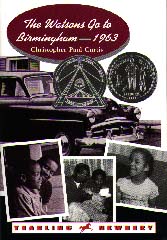


|
The Watsons Go to Birmingham.
Christopher Paul Curtis.
Subject Headings:
Grades 5 - 9 / Ages 10 - 14.
**** /4
|

excerpt:
"Dad, how come you always hide your toothbrush, why don't you keep yours with ours?"The Watsons do not, in fact, go to Birmingham until well into the book. They, Dad (Daniel), Momma (Wilona), Byron, who has just turned 13 and is, therefore, "officially a teenage delinquent", Kenny the narrator, and Joetta (Joey), live in Flint, Michigan, and the first half of the book is spent establishing the family as: a) weird, b) fun, and c) loving, with the exception of Byron who is "cool" instead of any of the above. The ultimate threat used to keep Byron in line is his Grandnma Sand who lives in B irmingham, Alabama, and is, according to Byron, who last saw her when he was four, "the meanest, ugliest person in the whole world". Finally Byron oversteps the limits once too often, and so the whole family is loaded into the Brown Bomber, as their car i s called, and they go off to visit Birmingham where Byron is to stay for the summer, and perhaps longer, in the hopes that a taste of life somewhere less tolerant than Michigan will teach him something.Dad laughed. "Well, Kenny, I guess I don't keep my toothbrush with the rest of yours because unlike your mother, I was a little boy once myself....I know that in a little boy's eyes there isn't anything in the world that is better for general cleaning tha n a toothbrush, and...the best toothbrush for cleaning stuff is always someone's else's."... Dad was right. I caught Byron using mine once to shine up some quarters and another time to brush Blackie's teeth. I didn't really care, but Blackie didn't like i t. That was the only time he ever growled at someone in his own family.
Birmingham in 1963 is in the throes of forced integration of schools, and it teaches all of them something. Joey goes off to Sunday School one morning, and the church is bombed. Four little girls die, but, by a miracle she is not one of them. Kenny is per haps the most upset, and it is in helping him to regain some balance in his life that Byron, who, after all, has not been left behind with his grandmother, learns some home truths about his own life.
This novel is both a Newbery honor book and a Coretta Scott King honor book, and it is easy to see why. It has overtones of Ramona Quimby in its depiction of family life, Watson-style, and while it holds out some hope for Byron's reformation, it do esn't make unrealistic promises. And its vignettes of school and friendship are frequently very funny. The epilogue gives a brief summary of the political situation at that time, thus putting the Watsons' story into its historical context.
Highly recommended.
Having started her working life as a chemist, Mary Thomas took the opportunity of a parenthood break to switch to a career in Kiddie Lit, first by selling children's books, and now as a library technician, working in two very different Winnipeg schools.

To comment on this title or this review, send mail to cm@umanitoba.ca.
Copyright © 1998 the Manitoba Library Association. Reproduction for personal use is permitted only if this copyright notice is maintained. Any other reproduction is prohibited without permission.
Published by
The Manitoba Library Association
ISSN 1201-9364
TABLE OF CONTENTS FOR THIS ISSUE - JANUARY 16, 1998.
AUTHORS | TITLES | MEDIA REVIEWS | BOOKSHELF | BACK ISSUES | SEARCH | CMARCHIVE | HOME